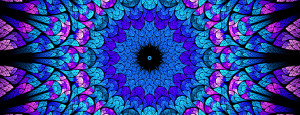As we walk through life, we develop filters or lenses that we see the world through and these determine the quality of our world more powerfully than anything else in our lives. Everyone is born into the same world and face challenges and joys and interpret their lives through those experiences, but the simple fact is that who we are and the joy and suffering in our lives comes down to simply how we perceive the events that happen in our lives. It is not the events themselves or what other people say about them, but how we look at them and internalize them. This is our perception filter and it defines how we see the world. It is also something that we can change.
Imagine that you are looking at paintings and have a choice of a piece of glass to look at the painting through. The painting in this thought is the even in our life and the glass is the filter that we perceive it through. If that piece of glass is red, all the red in the painting will be exaggerated and all the blues will be diminished. Same idea if we switch that piece of glass to blue glass, the blue will be bright and vibrant and the reds will be diminished. It is the same thing for our brains and how we perceive an event. If we look at the world through a filter that sees only the loss and pain of events, then that is all we will see, the good things will be diminished and less important in the overall scheme than the painful parts. Luckily for us, we can change our filter to see the good things from an event rather than the bad things and actually use that to exaggerate the good things in our lives and dimish the effect of bad things.
This power of ours is also predictive. I mean that if we walk around with a negative filter in place we will actually find negative things about encounters and events that have no negativity in them. We will have trained ourselves to reinforce the filter that we have in place. With a negative filter in place, we walk into a coffee shop expecting that the server will be surly and get our order wrong, so we will interpret normal interactions as negative ones, creating negativity in our lives where there wasn’t any in actuality. In this case, the normal interaction with the server becomes strained and a source of strife and frustration in us, and this is all done needlessly. The reverse is also true. If we walk into that coffee shop with a positive filter in place we do so expecting a pleasant interaction, and that is exactly what we will get, no matter the actual interaction. When all is said and done, the actual interaction with the server is probably neutral in the scheme of our lives, but the filter that we see it through defines how we come away from it, more stressed than we were or feeling better about the day and about life.
This brings me to the concept of using a gratitude flitter on life. As we go through our day, we can change the filter we have in place by having a gratitude mindset. If in every interaction we actively look for the things in that interaction that we are grateful for, we will start to reprogram our filter to see the positives in life and eventually that will be the majority of what we see out of any event in our lives. This changes how we walk through life, the people that we keep close and the joy that we feel.
xiaoyi has a great practice that she uses to keep her positive filter in place day after day and week after week. Before bed, she will pull out a notebook and list at least three things that she is grateful for during the day, three things that made her day better. This focuses her mind on the positive and drags it away from thinking about the negative. The filter programming is shockingly effective at changing the course of our lives. So when will you be starting a gratitude log and changing that filters that you see the world through? What tricks do you have to keep your filter positive and not let the cynicism of our culture turn it into a negative filter?


Recent Comments